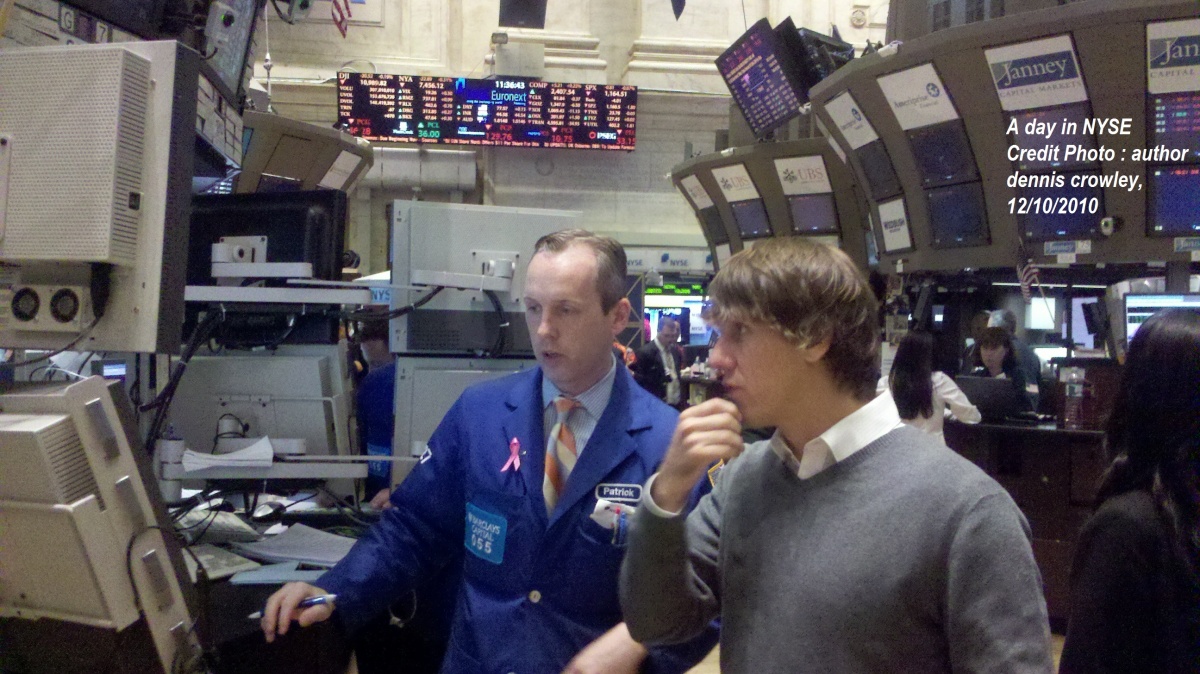A path of excellence into a highly desirable field
A Trader’s occupation
 A Trader, or a market-financing operator, is by definition a provider of market liquidity, who serves as a wholesaler for clients hoping to invest in the market without understanding the rules.This is the foundation of trading, which will be detailed from the first days in the Trading school’s market finance program. This type of Trader is also called a market maker. Clients hoping either to build a portfolio or sell their assets go through a Trader who provides them with the market’s current buying or selling price.It is important to note that most market makers are specialized in a niche, for example in EUR/USD.Market makers are not stakeholders who direct the market; they must not take risks while conserving their position without cover.
A Trader, or a market-financing operator, is by definition a provider of market liquidity, who serves as a wholesaler for clients hoping to invest in the market without understanding the rules.This is the foundation of trading, which will be detailed from the first days in the Trading school’s market finance program. This type of Trader is also called a market maker. Clients hoping either to build a portfolio or sell their assets go through a Trader who provides them with the market’s current buying or selling price.It is important to note that most market makers are specialized in a niche, for example in EUR/USD.Market makers are not stakeholders who direct the market; they must not take risks while conserving their position without cover.
Traders earn money from the client via the spread, the margin between the price of sale and the price of purchase. This spread is their only goal; it must remain positive, as their compensation—and their famous bonuses— is, in part, variable, and reliant on these spreads.
The other type of Trader is the Prop Trader or the Proprietary Trader. These Traders correspond to the common public image of a Trader, and are not always well perceived, despite the difficult work that they accomplish. Prop Traders are risk takers; they invest the money of banks, of brokerage firms or placement funds in speculative investments in order to draw benefits from them. Today this type of Trader works more and more in hedge funds rather than banks, as the subprime crisis has since restructured the system.
Recruitment of Traders
Being a market operator is a difficult career that requires immense understanding of financial systems, the English language, and above all, experience and practical skills: resistance to stress, adaptation to a stressful workplace, a taste for risk and self control. Today more and more market finance companies establish their recruitment criteria on candidate’s experience as an “assistant Trader”, as an independent Trader, or as a student in a trading training course.
Though it may be that this tendency is well established in the Anglo-Saxon financial world, which considers empiricism as a valuable means of education, the world of French finance primarily considers diplomas to be more important.
There are a large number of French graduates, who relocate with ease into foreign financial groups, but the number of them is growing to such an extent that sometimes recruiters require that Human Resources Departments only choose candidates who have had valid training experience as a Trader.
The CIT’s program offers an advantage by delivering its students with a complete training course, doubled with experience that is practical over the long-term. Upon graduation, CIT students are equipped with both a diploma and experience, and all the skills necessary to begin a career in a well-respected financial or banking group.
A Trader’s Career
The majority of the training program’s students find positions in international financial groups, where wages and responsibilities are at a maximum. The network that they will be able to develop throughout their training will not be meaningless. However, the positions in these groups remain fairly limited. Candidates can certainly join a bank or a brokerage fund of a more modest size, which are numerous and very active in the United States. In this type of structure, portfolios are not as sizable, but opportunities and compensation remain nonetheless quite attractive. The direction of Traders’ careers depends on their performance, so it is not rare to see a market operator move from a medium structure to a very large structure within several years.
The length of a professional career in the market depends generally on one’s performance. At the age of 83, Warren Buffet remains active as the best Trader in the world! Typically, however, a market operator retires after 20 years of activity, often as a result of a personal choice due to the demanding nature of a career in trading.
There is often the opportunity to ‘take a break’ before giving a new direction to one’s career. The possibilities for redirection are not in the least bit limited: Traders can choose to change their focus to banking, to financial counsel, or even to training hopeful Traders. The foundation built during their period of activity allows them to foresee a secure future. These funds can be used to realize a personal project, or put into an investment fund, which is a solution that many Traders choose, as it allows them to remain in contact with the field.
A Trader’s wages
Stricter compensation…
 The time of “the golden boys” has passed, and stockbroker’s bonuses are now more strictly controlled. This is important information for students graduating from the CIT’s trading school, as it is for all other students in trading courses. The margin of freedom allowed by regulations depends on the country: For example, France is much stricter than the United States. When we add the increased tax imposition to France’s negative image of Traders (which is frequently fueled by the media), it is easily understandable as to why many of France’s greatest financial minds expatriate to other countries as soon as they leave France’s most prestigious master’s programs.Currently, Europe limits to the bonus/salary ratio at 2 to 1, with the goal in some countries of a change to 1 to 1, which has not yet been reached.
The time of “the golden boys” has passed, and stockbroker’s bonuses are now more strictly controlled. This is important information for students graduating from the CIT’s trading school, as it is for all other students in trading courses. The margin of freedom allowed by regulations depends on the country: For example, France is much stricter than the United States. When we add the increased tax imposition to France’s negative image of Traders (which is frequently fueled by the media), it is easily understandable as to why many of France’s greatest financial minds expatriate to other countries as soon as they leave France’s most prestigious master’s programs.Currently, Europe limits to the bonus/salary ratio at 2 to 1, with the goal in some countries of a change to 1 to 1, which has not yet been reached.
Essentially, bonuses without limits are a thing of the past. That being said, in some ways this can be seen as a positive change, as it keeps Traders from blindly seeking compensation only to fall into catastrophe, as a result of excessive risk-taking.
...That remains nonetheless quite comfortable
The compensation of a Trader who has followed a structured trading course (such as that of the CIT’s) is generally quite high and is based as much on training as much as it is based on success on the trading floor.
In France, as in the rest of the world, bonus limitation and a smaller workforce as a result of the introduction of computers into decision-making have caused an increase in annual fixed salaries. After finishing his or her studies, a debutant Trader makes between 40,000 € to 60,000 €, bonuses not included. The increase of payment then depends on performance. On average, a Trader with five years of experience makes 300,000 € without a bonus. In France, this is confirmed by the numbers: The four largest banks employing the most Traders (Société Générale, BNP Paribas, Nexity and Credit Agricole) increased compensation to 300,000€ in 2013.
As for bonuses, they are equally variable, according to the structure where the Trader is employed, the specific country, and of course individual performance. On average, bonuses are double the set salary. Even so, the most renowned Traders in the United States can receive bonuses of up to several million dollars per year.

 A Trader, or a market-financing operator, is by definition a provider of market liquidity, who serves as a wholesaler for clients hoping to invest in the market without understanding the rules.This is the foundation of trading, which will be detailed from the first days in the Trading school’s market finance program. This type of Trader is also called a market maker. Clients hoping either to build a portfolio or sell their assets go through a Trader who provides them with the market’s current buying or selling price.It is important to note that most market makers are specialized in a niche, for example in EUR/USD.Market makers are not stakeholders who direct the market; they must not take risks while conserving their position without cover.
A Trader, or a market-financing operator, is by definition a provider of market liquidity, who serves as a wholesaler for clients hoping to invest in the market without understanding the rules.This is the foundation of trading, which will be detailed from the first days in the Trading school’s market finance program. This type of Trader is also called a market maker. Clients hoping either to build a portfolio or sell their assets go through a Trader who provides them with the market’s current buying or selling price.It is important to note that most market makers are specialized in a niche, for example in EUR/USD.Market makers are not stakeholders who direct the market; they must not take risks while conserving their position without cover. The time of “the golden boys” has passed, and stockbroker’s bonuses are now more strictly controlled. This is important information for students graduating from the CIT’s trading school, as it is for all other students in trading courses. The margin of freedom allowed by regulations depends on the country: For example, France is much stricter than the United States. When we add the increased tax imposition to France’s negative image of Traders (which is frequently fueled by the media), it is easily understandable as to why many of France’s greatest financial minds expatriate to other countries as soon as they leave France’s most prestigious master’s programs.Currently, Europe limits to the bonus/salary ratio at 2 to 1, with the goal in some countries of a change to 1 to 1, which has not yet been reached.
The time of “the golden boys” has passed, and stockbroker’s bonuses are now more strictly controlled. This is important information for students graduating from the CIT’s trading school, as it is for all other students in trading courses. The margin of freedom allowed by regulations depends on the country: For example, France is much stricter than the United States. When we add the increased tax imposition to France’s negative image of Traders (which is frequently fueled by the media), it is easily understandable as to why many of France’s greatest financial minds expatriate to other countries as soon as they leave France’s most prestigious master’s programs.Currently, Europe limits to the bonus/salary ratio at 2 to 1, with the goal in some countries of a change to 1 to 1, which has not yet been reached.






 All rights reserved.
All rights reserved.